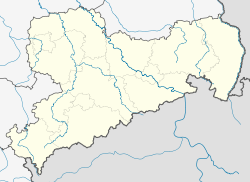
Torgau is a town on the banks of the Elbe in northwestern Saxony, Germany. It is the capital of the district Nordsachsen.

Jüterbog is a historic town in north-eastern Germany, in the Teltow-Fläming district of Brandenburg. It is on the Nuthe river at the northern slope of the Fläming hill range, about 65 km (40 mi) southwest of Berlin.
Israel Schwartz was a man who, in 1888, claimed to have witnessed an assault on a London woman that is believed to be tied to the Jack the Ripper slayings and one of the few people who might have had a good look at the murderer. Though he was described at the time as being from Hungary, 1891 census entries show him as being Polish and of Jewish descent.
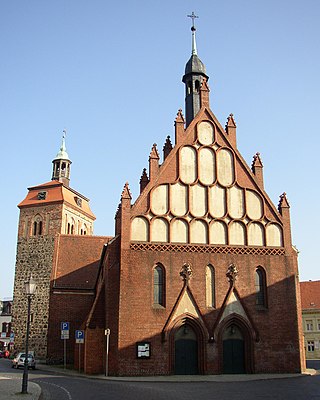
Luckenwalde is the capital of the Teltow-Fläming district in the German state of Brandenburg. It is situated on the Nuthe river north of the Fläming Heath, at the eastern rim of the Nuthe-Nieplitz Nature Park, about 50 km (31 mi) south of Berlin. The town area includes the villages of Frankenfelde and Kolzenburg.
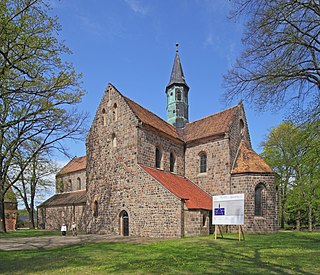
Zinna Abbey is a former Cistercian monastery, the site of which is now occupied by a village also called Kloster Zinna, today part of Jüterbog in Brandenburg, Germany, about 60 km (37 mi) south of Berlin. The village was established by Frederick II of Prussia as a village for weavers.
Vincenzo Zinna is a Swiss football player who last plays as a midfielder for FC Gossau in the Swiss Challenge League.
Rocco DiSiglio, also known as Rocky DiSiglio was an American professional welterweight boxer and associate of the Patriarca crime family who was involved in armed robbery and illegal gambling.

Printemps et autres saisons is the title of a collection of short stories written in French by French Nobel laureate J. M. G. Le Clézio.
Zinna is a genus of moths of the family Erebidae. The genus was erected by Francis Walker in 1869.

Medieval letter tiles are one-letter ceramic tiles that were employed in monasteries and churches of the late Middle Ages for the creation of Christian inscriptions on floors and walls. They were created by pressing stamps bearing a reverse image into soft clay, which was then baked hard, and they were used to form words by assembling single-letter tiles in the desired order.
Bellone is a white Italian wine grape variety that wine historians believed was cultivated in Roman times. By 1990, nearly 3,000 hectares of the variety was still being cultivated and eligible to be blended in the wines of several Latium Denominazione di origine controllatas (DOCs). According to wine expert Jancis Robinson, Bellone produces a juicy white wine.
Mumuye is by far the most populous of the Adamawa languages. It is spoken in northeastern Nigeria. It is classified in the Leko–Nimbari branch of Savanna languages, as Adamawa is no longer considered a valid family. According to Ethnologue, there are multiple dialects: Zinna, Rang (Lamma), Dong, Yoro, Lankaviri, Gola (Bajama), Gongla, Kasaa, Saawa, Jalingo, Nyaaja, Jeng, Gnoore, Yaa, Sagbee, Shaari, Kugong, Mang, Kwaji, Meeka, Yakoko.
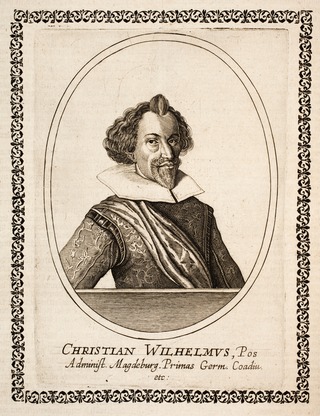
Christian Wilhelm of Brandenburg was a titular Margrave of Brandenburg, and from 1598 to 1631 Archbishop of Magdeburg.
The Forst Zinna rail disaster occurred 19 January 1988 in Forst Zinna, East Germany. It was the result of a collision between a Soviet T-64A tank and an express train on the Berlin–Halle railway, in an area often used by the Soviet military for tank training. Six people were killed, and 33 were injured. It was one of the worst railway accidents in the history of the GDR.
Riccardo Zinna was an Italian actor and musician.
The Zinna Coin Treaty of 1667 for the standardisation of coinage was signed at Zinna Abbey, approx. 50 km south of Berlin, between Electoral Brandenburg and Electoral Saxony. The treaty defines the 10½ thaler standard.
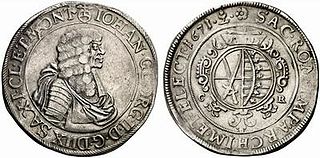
The Wechselthaler, also spelt Wechseltaler or Wechsel-Thaler, was minted in 1670 and 1671 in the Electorate of Saxony under Elector John George II (1656–1680) to the Wechselthaler or Burgundian thaler standard (861/1000 fineness). As the name suggests, the Wechselthaler and its subdivisions were intended as a currency to encourage Leipzig's trade with Hamburg and the Netherlands. The first coins from 1670 therefore bear the inscription WECHSELTHALER on the reverse. The Wechselthaler standard was only valid in Electoral Saxony in 1670 and 1671.
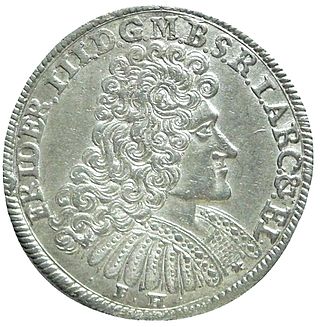
The Leipzig standard, sometimes called the Leipzig Mint standard, was a standard of coinage or Münzfuß originally established by the Electorate of Brandenburg in 1687 for silver coins and known as the 12-Taler standard to replace the Zinna standard.




